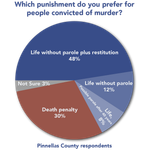

Recently released poll results from two Florida counties that have heavily used the death penalty suggest that voters actually prefer life-sentencing options instead.
Polls conducted by North Carolina-based Public Policy Polling on January 22 – 23, 2018, indicate that three-quarters of Miami-Dade County respondents preferred some form of life imprisonment rather than the death penalty as the punishment for people convicted of murder, and two-thirds of Pinellas County respondents preferred one of the life-sentencing options. The margin was more than 3 to 1 in Miami-Dade (75% to 21%) and more than 2 to 1 in Pinellas (68% to 30%).
Of Miami-Dade respondents who chose a life-sentencing option, a plurality (40%) preferred life without parole, plus restitution; 18% preferred life with the possibility of parole after 40 years; and 17% preferred life without possibility of parole. In Pinellas, 48% preferred life without parole plus restitution; 12% preferred life without parole; and 8% chose life with parole eligibility after 40 years.
Sixty-eight percent of Miami-Dade respondents said they would support a decision by their local prosecutor to reduce or eliminate the use of the death penalty, compared to 25% who opposed. In Pinellas, 64% said they would support reducing or eliminating the use of the death penalty, as opposed to 32% against. Pinellas/Pasco State Attorney Bernie McCabe reportedly has filed notice that he will seek the death penalty in 15 pending cases and six re-sentences, with nine death-penalty trials already scheduled for 2018.
Floridians for Alternatives to the Death Penalty released the Pinellas County poll on February 27 and the Miami-Dade poll on March 1. The organization’s director, Mark Elliott, said “[t]he survey results make clear that the state attorney’s office is ignoring the will of the overwhelming majority of Pinellas County constituents who prefer life sentences for those convicted of murder.” Elliott also said that “[e]xpensive death penalty trials do nothing to prevent violent crime, protect law enforcement, or help victims’ families in meaningful ways, and mistakes are also all-too-common.”
DPIC reported in 2013 that both Miami-Dade and Pinellas were among the 2% of counties that accounted for more than half of all death-row prisoners and executions in the United States. Both were among the Fair Punishment Project’s list of 16 outlier counties that imposed five or more death sentences between 2010 and 2015 — more than 99.5% of all counties in the country.
The polls also showed strong opposition in both counties to local prosecutors seeking to impose the death penalty against persons with severe mental illness. Miami-Dade respondents expressed overwhelming opposition to the practice, by a margin of more than 4 to 1 (70% to 17%). The margin was more than 3 to 1 in Pinellas, with 66% opposing and 21% supporting the practice.
The poll also found more respondents in both counties opposed applying the death penalty to defendants under age 21 than supported that practice, and — when prompted with information that Florida death-penalty cases cost an estimated $1 million dollars per case — 65% of Miami-Dade respondents and 60% in Pinellas preferred prosecutors to use life without parole and redirect the savings to solving rapes and murders.
Public Policy Polling surveyed 269 voters in Pinellas County and 268 from Miami-Dade. The polls each have an error rate of ± 6 percentage points.
D’Ann Lawrence White, Survey Shows Most Pinellas County Voters Oppose Death Penalty, Patch, March 2, 2018; Kate Bradshaw, Poll suggests Pinellas County residents oppose the death penalty, CL Tampa Bay, February 28, 2018; Mark Elliott, Press Advisory: Pinellas Co. FL Death Penalty Polling Results, Floridians for Alternatives to the Death Penalty, February 27, 2018.
Read the Miami-Dade County poll results here and the Pinellas County poll results here. See Florida and Public Opinion.
Mental Illness
Dec 06, 2024
Indiana Plans to Resume Executions after 15-Year Pause with a Severely Mentally Ill “Volunteer”
Mental Illness
Oct 24, 2024